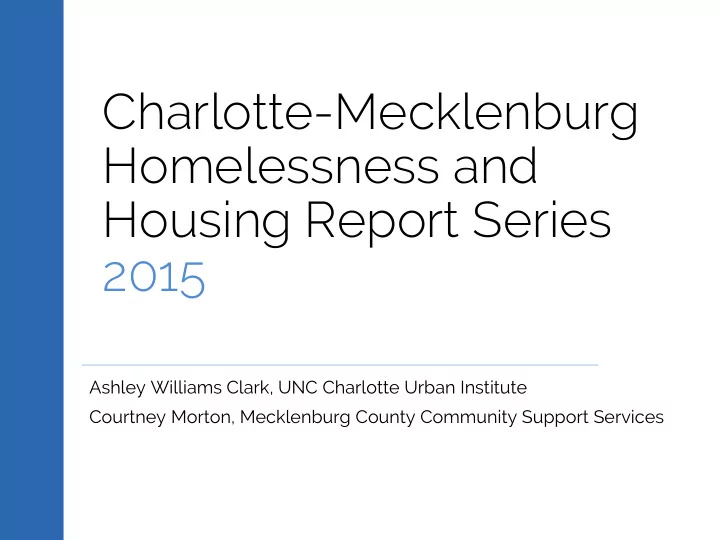

Charlotte-Mecklenburg Homelessness and Housing Report Series 2015 Ashley Williams Clark, UNC Charlotte Urban Institute Courtney Morton, Mecklenburg County Community Support Services
Housing Instability and Homelessness Report Series Point-In- Housing Cumulative Spotlight Time Count Instability Count Report Report Report(s) Report
Housing Instability and Homelessness Report Series Point-In- Housing Cumulative Spotlight Time Count Instability Count Report Report Report(s) Report
Number of people 2,001 identified as homeless 29% from 2010 1% from 2014
Number of people who 180 were unsheltered 76% since 2010 10% since 2014
125 volunteers
Child only 0.60% Adults and children 38% Household types Adults only 61%
Increase in households with adults and 67% children in emergency and seasonal shelter since 2010
Characteristics 25% Youth
Characteristics 25% 82% Black Youth
Characteristics 25% 82% Black Youth Mecklenburg County is 31% Black
Characteristics 25% 82% 3% Black Youth Latino
Characteristics 25% 82% 3% Black Youth Latino Mecklenburg County is 12% Latino
Characteristics 25% 82% 3% 43% Black Youth Latino Female
Characteristics 25% 82% 3% 43% Black Youth Latino Female 91% of unsheltered population was male
Housing Instability and Homelessness Report Series Point-In- Housing Cumulative Spotlight Time Count Instability Count Report Report Report(s) Report
Housing Instability in Charlotte-Mecklenburg 2015
46% of renter households were cost burdened Mecklenburg County, 2013
27% of owner- occupied households were cost burdened Mecklenburg County, 2013
Change in rent vs. income 2008-2013, adjusted for inflation Rent 2% Income -12% Source: U.S. Census Bureau American Communities Survey 1-Year Estimates.
Cost burdened renter-occupied households by race Mecklenburg County, 2008 - 2012 Severely Cost burdened Cost burdened 52% 47% 36% 26% Black Hispanic White-non Asian hispanic Source: U.S. Department of Housing and Urban Development Comprehensive Housing Affordability Strategy (CHAS) dataset, 2008-2012.
Cost burdened owner-occupied households by race Mecklenburg County, 2008 - 2012 Severely Cost burdened Cost burdened 44% 36% 34% 22% Black Hispanic White-non hispanic Asian
Hours per week a person making minimum wage 88 must work to afford a two- bedroom unit at FMR
Characteristics of Charlotte Housing Authority Housing Choice Voucher Waiting List 2015
Households on 31,723 waiting list As of January 2015
Demographic Profile 5% 3% 86% 93% Elderly Latino Female Black (62+)
Majority (71%) of applicants are extremely low income Other 7% Very Low Income 22% Extremely Low Income 71%
Affordable Housing Not enough Applicants Applicants resources to on HCV on HCV 31,723 31,723 meet need waiting list waiting list
Affordable Housing Not enough Applicants Applicants resources to on HCV on HCV 31,723 31,723 meet need waiting list waiting list Vouchers available to 200-240 new clients each year
Housing Instability and Homelessness Report Series Point-In- Housing Cumulative Spotlight Time Count Instability Count Report Report Report(s) Report
HMIS VETERANS BOTH AGENCIES SERVICES ONLY ONLY
HMIS VETERANS BOTH AGENCIES SERVICES 94 ONLY ONLY 1,510 71 1,675 unique veterans utilized services
SERVICE UTILIZATION OF VETERANS BY YEAR 2007-2012 HMIS only Both Veteran Services Only 2007 167 11 8 New HMIS 2008 211 20 12 Data Standards 2009 Implemented 194 10 11 2010 430 30 13 2011 394 26 9 2012 361 24 19 Note: For "HMIS Only" and "Both," the year represents the year in which the veteran received homeless services. For Veterans Services only, it represents the year in which the veteran first came to Veterans Services.
Housing Instability and Homelessness Report Series Point-In- Housing Cumulative Spotlight Time Count Instability Count Report Report Report(s) Report
PIT HMIS Sheltered on one Sheltered at some night in 2014 point during 2014 1,850 6,498
From 2013- 2014… Sheltered homelessness increased 10% (602 people)
From 2013- 2014… Sheltered households with children Sheltered increased 14% homelessness (232 people) increased 10% (602 people)
From 2013- 2014… Sheltered veterans decreased 3.5% (17 people) Sheltered households with children Sheltered increased 14% homelessness (232 people) increased 10% (602 people)
Now we have data. So What? What do we do with the information we now know?
“Numbers have an important story to tell. They rely on you to give them a clear and convincing voice.” Stephen Few
What story is our data telling?
What does our story say about our community?
What are critical points in our story that we can change?
Some Critical Story Points Successes but • We have some successes in decreasing homelessness among chronic and veteran still work to be populations, but our family and sheltered done homelessness populations are increasing. Housing • Housing instability affects a large group of individuals and households in our instability has a community. significant impact • African Americans are overrepresented in our homeless population and those facing Race matters housing instability.
Final Questions for Discussion Who else needs How do we tell to hear this our story? story? What critical How can we points do we change our change first? story? Why?
Questions & Discussion
Recommend
More recommend